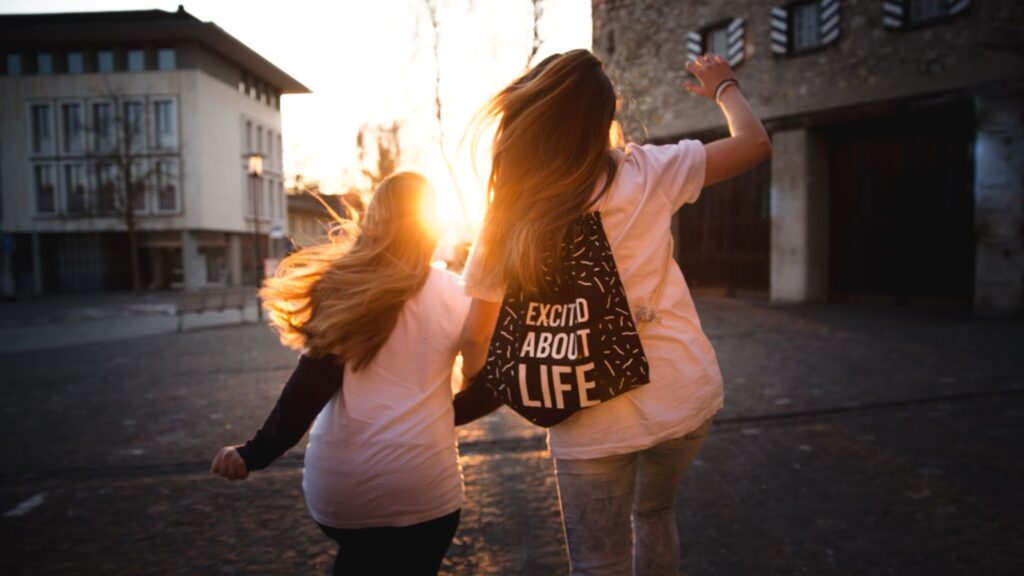‘Fetch’ is out. A new era of female friendship is in.
In middle school, my friends and I were obsessed with reading Lisi Harrison’s The Clique series. It was the precursor to The Twilight Saga, which later took precedent. We carried copies of the bounded, plaid books to and from class, exchanging laughs about the chapters we were reading. But with titles like, ‘Best Friends for Never’ and ‘It’s Not Easy Being Mean,’ it’s no wonder these books fueled a precarious notion of girlhood.
I don’t think I realized the effect that reading these books had on me until years later. It was considered a popular series for girls my age. There were, as far as I know, no cries from parents calling for a ban on these books from their daughters. But flipping through the incredibly
detailed diaries that I (regrettably) kept during this time, it’s apparent to me now just how much of a negative impact this series had on me as a young girl.
My journal entries included what could be summarized as the typical dramatics of girlhood, complete with recurring ‘he said, she said’ antics and hearts drawn around the names of boys I liked. But my writing also often reflected the same superficial, snobbery tone of The Clique. I even adopted phrases from the books like ‘A-Listers’ when referring to popular kids at school. At one point, I wrote about forming my own Clique-inspired ‘Pretty Committee’ (yes, that is what the girls in the series call themselves). And while I wrote that it would be a secret as to not upset those who were uninvited, in true The Clique fashion, the secret got out and drama ensued.
Simply put, the girl I was back then isn’t someone I think I would like all that much today.
I could blame The Clique series entirely for my self-obsessed pre-teen spirit. But it wasn’t just the books. Rather, my adolescence corresponded with what could be called the ‘Mean Girls’ era of TV and film.
Tina Fey’s blockbuster movie Mean Girls set a new tone for the classic girl-on-girl drama comedy when it came out in 2004. It’s since become a cult classic of my generation. But at the time of its release, I was too young to understand the satirical components of the film that poked holes in the societal norms and pressures that teenage girls often face. Instead, to my friends and me, the movie reinforced girl-on-girl aggression as a ‘normal’ part of the teenage experience we were yet to encounter.
Mean Girls, of course, didn’t invent the ‘frenemy’ plot line. There were plenty that came before it and a whole bunch that came after. Movies like Bring It On and John Tucker Must Die were sleepover staples. Pretty Little Liars was admittedly my favorite show in high school. It seemed that everywhere we looked, jealousy-ridden girls were playing games on one another and trading friendships in for the likes of boys. I’m not sure it ever dawned on us that reality should look any different.
I wonder now if this media could have enabled a self-fulfilling prophecy of some kind. Because we were taught that girl-on-girl aggression was the norm, did we internalize that as a rationale for engaging in it ourselves? When mean girls said or did hurtful things in real life, it was excused just as it had been in the movies. “That’s how girls are,” were the words of comfort that often came from other women.

In recent years, we’ve entered a new era where genuine female friendship is front and center in shows like Comedy Central’s Broad City and Netflix’s Dead to Me. As such, the depiction of girlhood in the media has also changed. Watching movies like the teen comedy Booksmart, have made me reminiscent of my youthful friendships. But at the same time, disappointed that I never had Molly and Amy’s kind of ambitious, feminist friendship in my own adolescence. I’m not sure I even knew this type of friendship could exist.
Instead, my female friendships growing up were often complicated. They started out strong in middle school, but by the end of high school the ties that held us together had already unraveled. The stereotypical clichés were to blame in most cases – jealousy, pettiness to the point of manipulation, and of course, boys we allowed to come between us.
I’ll admit that I wanted to see myself as a victim at the time, but in retrospect, I know I wasn’t entirely innocent. I made plenty of mistakes. I chose boys over my girlfriends when I shouldn’t have. I tried too hard at times to be someone I wasn’t. I was both overly confident and insecure, and all too naïve.
I hope that this new era of female friendship in the media inspires a new narrative for girlhood – one where girl-on-girl aggression isn’t the norm. And while we’ve made progress, I also hope the media continues to do better by women. I’m looking forward to seeing what new movies, TV shows and even the revivals of old series will offer us. Will we see traits of Serena and Blair’s complicated friendship in the HBO Max reboot of Gossip Girl? Or will these new characters show us something different?
I’m happy to say that my female friendships today look nothing like those of The Clique or Mean Girls. It might have taken twenty years, but I consider myself incredibly lucky to call the strong, ambitious, creative women in my life my friends. These friendships are ones where we celebrate one another’s victories, talk openly about our insecurities, dream up new possibilities together and laugh at jokes only we understand.
The TV shows and movies my friends and I watch still regularly come up in conversation. Media continues to influence us even today. But the difference is that we see ourselves in these modern-day depictions of female friendship. We hype one another up just as Jess and Cece do in New Girl. We laugh our way through awkward situations like Abby and Ilana in Broad City. Finally, the female friendships we see in the media look as real and messy and beautiful as we are.




